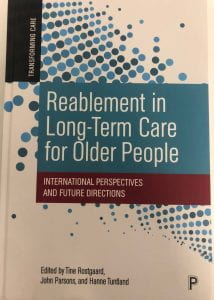 |
Edited by Tine Rostgaard, Roskilde University and Stockholm University, John Parsons, The University of Auckland and Hanne Tuntland, Western Norway University of Applied Sciences and Oslo Metropolitan University
The edited book on reablement written by members of the Reable network is now on sale in a paperback version. You can order it on this link: https://policy.bristoluniversitypress.co.uk/reablement-in-long-term-care-for-older-people
|
| “A valuable and timely resource for policy makers and practitioners. Robust cross-country and interdisciplinary research shows how reablement can reduce long-term care costs, improve wellbeing and professionalise care work.” Caroline Glendinning, University of York
“Policies that prevent poor health as people age, help them participate in communities and provide people centred care are imperative for societal wellbeing and a healthy economy. In this inspiring book, the authors trace the path for re-enabling in long-term care.” HB Francesca Colombo, OEC |
|
| PART I Reablement in contexts, ideas, and implementation
1. Introduction: The concept, rationale, and implications of reablement – Tine Rostgaard, Hanne Tuntland and John Parsons2. Perspectives on institutional characteristics, model features, and theories of reablement – Hanne Tuntland, John Parsons and Tine Rostgaard 3. The ideas of reablement and their travel across time and space – Marte Feiring, Oddvar Førland, Fiona Aspinal and Tine Rostgaard 4. Reablement as an evolution in home care: a comparison of implementation across five countries – John Parsons, Elissa Burton, Lea Graff, Silke F. Metzelthin, Hilary O’Connell and Hanne Tuntland PART II Outcomes 5. Does reablement improve client-level outcomes of participants? An investigation of the current evidence – Gill Lewin, John Parsons, Hilary O’Connell and Silke F. Metzelthin 6. Examining client-level outcomes and instruments in reablement – Hanne Tuntland, Daniel Doh, Maria Ranner, Susanne Guidetti and Magnus Zingmark 7. Reablement as a cost- effective option from a health economic perspective – Magnus Zingmark, Hanne Tuntland and Elissa BurtonPART III Experience 8. Reablement and dementia – Miia Rahja and Jette Thuesen 9. Better care, better work? Reablement in Danish home care and the implications for care workers – Tine Rostgaard and Lea Graff PART IV Future perspectives 10. How can we help? Promoting autonomy-compatible help to reable older adults – Amy Clotworthy and Rudi G.J. Westendorp 11. A cross-country reflection on empirical and theoretical learnings, challenges, and the way forward for reablement – John Parsons, Hanne Tuntland, Michelle Nelson, Rudi Westendorp and Tine Rostgaard |
|